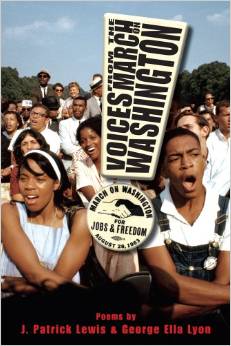2018 School Spending Survey Report
Voices from the March on Washington
LEWIS, J. Patrick & . 128p. bibliog. further reading. index. websites. Boyds Mills/Wordsong. Oct. 2014. Tr $15.95. ISBN 9781620917855.
COPY ISBN
Poets Lewis and Lyon here give voice to a cross-section of the 250,000 participants of the 1963 March on Washington: from first grader Ruby May Hollingsworth and Aki Kimura, a Japanese American sent to internment camp during WWII, to Coretta Scott King. Many fine works on the civil rights movement are available; this adds the power of poetic imagination. Reading list, websites. Bib., ind.
ALREADY A SUBSCRIBER? LOG IN
We are currently offering this content for free. Sign up now to activate your personal profile, where you can save articles for future viewing





Be the first reader to comment.
Comment Policy:
Comment should not be empty !!!